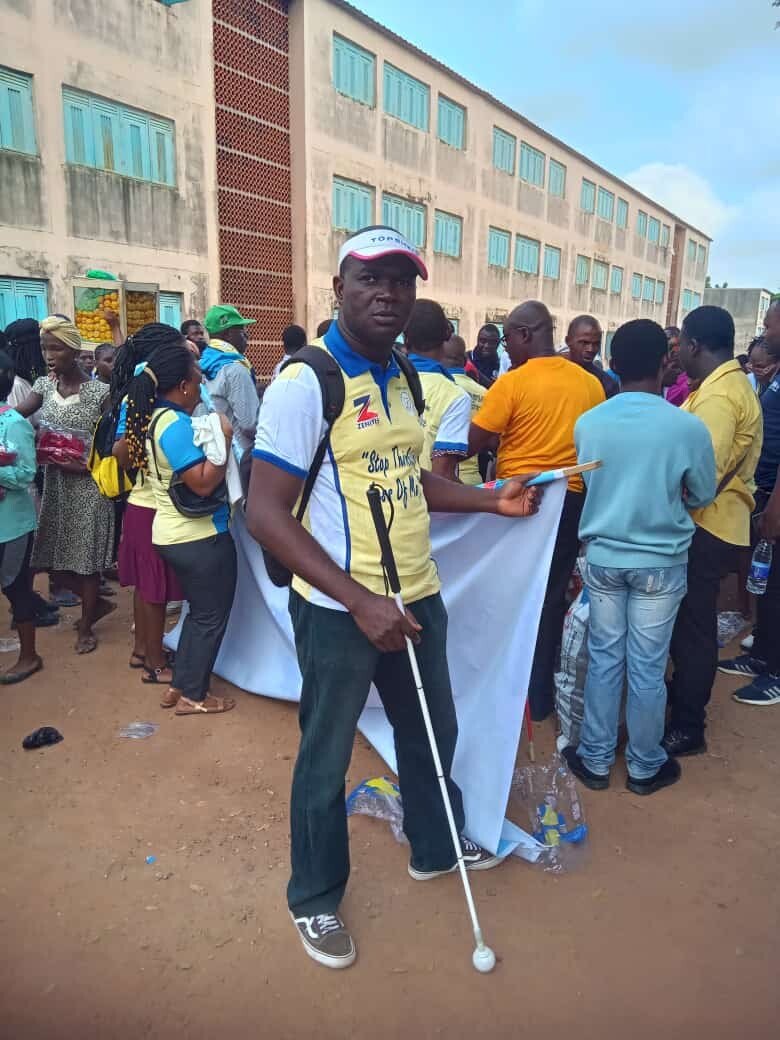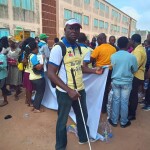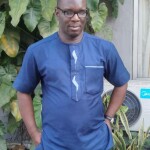Embracing their reality, they find a rod of limitation become a staff of freedom
By Elijah Olusegun
Among people who have made peace with situations they can’t control, Fine Boy stands tall.
He peeled off his shirt in the midst of the bubbling crowd. Nobody cared. Most of those preparing for the annual walk could never bother.
“Tell them the person leading the parade has no clothes on.”
He clung to the association’s banner at one end; a lady held the other. His pose was militant, especially with his black knapsack housing a couple of items, including a collapsible silver rod with a bulb at the lowest end.
By now all eyes were on Fine Boy. Shirtless. He still didn’t give a damn. For about 13 years, that was how he’d be living, acting. Free like a bird. He got more dramatic at a point in those years.
The point usually turns out an epiphany. Many like him attain it at different milestones in their journey. His colleague Funmi also experienced that change sometime in her past. That was after she graduated from a vocational school where she learnt all sorts of craft, including farming. She got to the end of her rope then.
Some don’t like—or accept easily and early—such sudden changes to their lives, according to Barrister Lukman Salami whom Fine Boy was sending repartees. Society, too. The lawyer talked about a culture that attaches limitations and dependence to reduced abilities.
Salami and another guy now addressed the crowd through a PAS. Fine Boy kept heckling them. His fellows weren’t quiet, either. They barged into one another; they hugged, bantered, laughed.
But the rally needed some method to it. About a dozen brethren from the Bible Society of Nigeria had been doing the hard job of organizing them since 7 am inside Owoseni Primary School, Oshodi, Lagos. It took a lot of grit to muscle people like Fine Boy into a place where they wouldn’t bump others into vehicles or something.
He stood rooted at his spot. The rising sun filtered through the canopy of an acacia tree above him. The sheen left in his greying chest hair was reacting to the warmth. Since nobody listened to him, he bulled his way down to where Salami stood—to make his point clearer. His biceps rippled with the push and shove that travelled through the throng.
Not much of a commotion yet.
After about three hours of mobilizing, T-Shirt distribution, and pep talks, the organizers and the BSN whipped the crowd into Indian file. In his medium-sized yellow T-shirt with a Zenith Bank crest, Fine Boy and the lady he now called Fine Girl, a psychologist, took their place in the front.
Amidst the banter, she asked for Fine Boy’s description.
“Tall. Muscular, and …”
She smiled. Her cheeks’ apples gently lifted.
Fine Boy kept silent.
“I hope I am fine, too?” She wasn’t exactly asking.
Some officers of LASTMA and kids that came to play football stood by, watching the couple. If she knew how they eyeballed her—or heard their comments about Fine Boy’s luck—she would have her affirmation.
The rally careered out of the compound eventually. Fine Boy and Fine Girl took the lead, holding the banner. A number of volunteers were in the vanguard. Some marchers still ran into opened car doors along the way, especially under the Apapa-Oshodi express flyover. Others blundered into the kerb. But most maintained a straight line that got too long at times, and jackknifed at intervals. The loudmouths among them joked and cheered.
“They have to make themselves happy anyhow,” an elderly volunteer said. She was reacting to a joke from a number of them that bunched up when they descended into a porthole along the CAPPA road. The weak-legged and faint-hearted ended up in a Coaster following the rally. It took about 50 minutes to hoof it down to NITEL. It could have been longer but for the traffic management officers forcing motorists to give the marchers right of way.
In climes where equality matters, there are white cane laws that make other road users respect bearers of the white cane. The Nigerian Discrimination Act 2018 doesn’t say that specifically. So motorists, especially danfo drivers, who don’t care could floor it if no LASTMA officer was looking.
The final stretch of the asphalt, off the Mushin road, threw up an event. A volunteer didn’t watch out. So a marcher stomped a cooler of beverages by the roadside. The angry seller said she could have smacked the blunderer in the cheek.
The march ended on NITEL premises, in front of a building leading to the hall of meeting. Fine Boy didn’t break much sweat. He still clutched at his banner now folded into a crooked roll. Many of them unfurled their canes: new ones which Zenith Bank provided, and Salami distributed at Owoseni; or the old ones which many of them still cherished so much. Like Fine Boy’s.
“It’s my identity,” he said.
Funmi, too. “It has brought me recognition and favour without begging.”
Both of them made a point about one thing: the independence the white cane brought into their lives when they eventually embraced it. Salami said some have yet to accept this reality of theirs—because of culture.
“The white cane is what the Yoruba call opa afoju (a symbol of handicap). Who wants to associate with that ordinarily?”
Here were hundreds of people who already did.
“I have travelled alone, with my cane, from Ayobo to Abuja. I can go anywhere with it now,” Funmi said.
She struck out suddenly with her long fingers wrapped around her cane.
“Did I hit you? Oh, I’m sorry.”
Funmi didn’t immediately warm up to the cane after her mobility training at Farm Craft in the Isheri area of Lagos. She hired people to guide her whenever she went out. “I paid their transport fares. If they said they were hungry, I bought them food. And back home, I still paid them.”
Now her staff alone brought her here, across five busy bus stops, and crowded, broken walkways.
Before he started using his cane, Fine Boy would almost fall into ditches before people knew he needed help. “When they see me now, they readily assist,” he said. The cane can’t be divorced from him—for anything.
A lady once decided to help him around. She held his hand, and told him to fold the cane. He refused.
While he was explaining to her what it meant to him, a passer-by bumped into them. “He told us we should at least go home to display our love.” That exactly was Fine Boy’s point to the lady guide. The other man saw their interlocked hands only—not the cane.
“In situations like that,” he said, “I will hit his foot with my cane so he’ll know.”
The hall brimmed over now.
No fewer than 500 members of the Nigeria Association of the Blind, Lagos, sat in there to celebrate the year’s White Cane Day that comes up October 15. The mood swung high. KWAM 1 songs thumped the sound system, and the melodies wafted across the hall. Two guys stood up and boogied jerkily; many rocked to the beat in their seats. Others just relaxed, listening as they took down throatfuls of cold table water.
Fine Boy sat at the back—for ease of movement by 12 when he wanted to hit the road again. A film of sweat moistened his dark skin. Funmi sat a row behind him. He needed to see Fine Girl for something. She sat somewhere in the front. Her skin glowed in the white light that pooled in the hall as she walked body-guided down the hall to meet him. He handed her some wrapped object. Sitting down, Fine Boy was almost about her height standing up. The difference didn’t push the digital exchange off mark, though. They confirmed contacts earlier exchanged, and said goodbyes. Behind them, a colleague of Funmi’s came and took the seat beside her. His territoriality and earthiness divided her attention, and the white cane discussion collapsed.
Fine Boy’s cane stood at the ready—unlike most others held leisurely around the hall. He needed help to run the gauntlets of canes and legs straggling out on the aisle that led to the main door. There was no point asking: the white cane has limitations. The association reflected that fact in the theme of this year’s celebration: Safeguarding the life and movement of the blind.
In a press statement the association’s spokesperson Gbenga Ogundare released, Salami welcomed the effort of Lagos government in clearing sidewalks, ramps and pedestrian bridges of omnipresent hawkers and traders. They hazard the lives of people with limited mobility, in many ways. Their ableism can make life difficult for the blind, in spite of the powers and privileges of the white cane.
Attitude of those with no disabilities matters.
Funmi and her colleague were fished out of a canal in Alimosho during the 2020 celebration. Their canes failed them. A volunteer told them to keep moving. So did they, until they tipped over, cane and all.
“Some walked into electric poles,” she said. “Many people were injured and hospitalized that year… because of the careless volunteers.”
The cane can’t handle the loo, either—in a community where discrimination reigns. Salami had to defend a member whom other tenants rejected somewhere in Oshodi early this year. They didn’t like to share a toilet with a blind tenant.
The Discrimination Act has taken care of all these. It annoys Fine Boy the disability community likes to sit back, and expects to have their rights delivered on a platter. “The government has done what they can. Have we attempted to make the NCPWD fight for us? No. We just complain,” he said, narrating how he always pushed for the greater good of the NAB in his charge at the Ifako-Ijaye LG.
He seized the moment to identify himself: Aanu-Oluwa Yinka. He works in advocacy.
A younger colleague of his two seats away overheard him. The introduction ended, and the two chatted like not-so-long-lost friends.
“See your cheeks. You’re really enjoying.”
Yinka didn’t respond immediately.
“When did your eyes open that you can now see my cheeks?” He deadpanned.
It was about eight minutes to the hour. Yinka paced out of the hall. The cloud was taking all its time to roll about the clear sky; the surrounding, too, was relaxed. He dialed the cane right and left on the road. The bulb at the other end moved on the asphalt. He said it rolled around a wider arc than the regular cane, and helped him feel the lay of the land ahead.
The traffic was light on the main road. Crossing to the Oshodi lane from the Mushin’s side took a few seconds. A beat-up danfo shot past him before it stopped. He strode a little up to it, and rode shotgun in the empty bus.
In a minute or two, he’d alight and plow his way through the thick of Oshodi, cane in hand.







